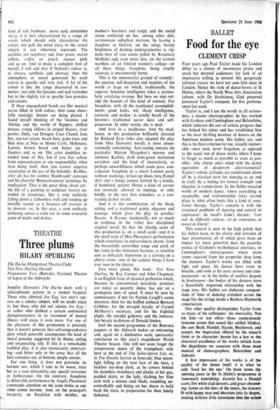THEATRE
Three plums
HILARY SPURLING
The Ha-ha (Hampstead Theatre Club) Not Now Darling (Strand) Programme Two (Bunraku National Theatre of Japan at the Aldwych)
Jennifer Dawson's The Ha-ha deals with a schizophrenic patient in a mental hospital. Those who admired Joe Egg, last year's suc- cess on a similar subject, will no doubt enjoy it; but those who did not admire Joe Egg— or rather who disliked a certain sentimental disingenuousness in its treatment of mental illness—will enjoy it even more. For one of the pleasures of this production is precisely that it doesn't generate that self-congratulatory glow which generally accompanies the kind of moral penance suggested by its theme, setting and unappealing title. If this is a remarkably truthful play, it is also insouciantly entertain- ing—and bitter only in the sense that all the best comedies are, at bottom, deeply sinister.
For one thing, it does not patronise its heroine nor, which I take to be worse, treat her as a case demanding any special reverence or forbearance. On the contrary, Josephine (a delectable performance by Angela Pleasence) commands attention on the same terms as any other comic heroine. And, on the principal's tea-party, on breakfast with mother, on mother's bossiness and vanity and the social status conferred on her, among other dim, acrimonious suburban matrons, by having a daughter at Oxford; on the smug, barmy brightness of dashing undergraduettes (a vig- nette here of rare comic polish by Rosemary McHale) and, even more dire, on the earnest worthies of an Oxford women's college—on all these things Josephine, being cruelly accurate, is uncommonly funny.
This is the immemorial ground of comedy: the unction, self-deception and inanities of the world at large on which, traditionally, the superior feminine intelligence takes a particu- larly satisfying revenge. But here we step out- side the bounds of this kind of comedy. For
Josephine, with all the traditional accomplish- ments—good looks, wit, sharp intelligence, curiosity and malice—is cruelly bereft of the heroine's traditional .savoir faire and self- possession. In other words, she is mad.
And lives in a madhouse. And the mad- house, in this production brilliantly directed by Richard Eyre (who also adapted the play from Miss Dawson's novel), is most unsen- sationally convincing : hair-raising inmates (in particular Miriam Margolyes's morose and ominous Kathie), drab mint-green institution corridors and the kind of insensitivity, or perhaps unworldliness, which sends poor, con- valescent Josephine to a smart London party without stockings, in lace-up shoes, long flannel skirt and a lumpy jumper knitted by a kindly, if hamfisted, patient. Hence a kind of sorrow not normally allowed to impinge, or only briefly, in the very best comedies, as a con- trasting darker strand.
And it is this combination, of the bleak setting and a traditional gaiety, elegance and courage, which gives the play its peculiar flavour. A flavour, incidentally, not so much in evidence in the rather less disciplined original novel. So that the closing scene of this production is, on a small scale—and it is the small scale of Miss Pleasence's performance which constitutes its extraordinary charm, from the beautifully controlled range and pitch of her voice to her miniature features, as sensitive and as delicately humorous as a carving on a cherry stone—one of the saddest things I have ever seen in the theatre.
Two more plums this week : Not Now Darling, by Ray Cooney and John Chapman, is an English farce of classical perfection which, because its conventional moralistic premises are today so quaintly shaky, has put on a prodigious turn of speed. It must be seen by connoisseurs, if not for Patrick Cargill's astute direction, then for the baffled pinhead Bernard Cribbins, for the intrepid loyalty of Carmel McSharry's secretary, and for the frightful plight, the suicidal gallantry and the immacu- late beauty in distress of Donald Sinden.
And the second programme of the Bunraku puppets at the Aldwych makes an entrancing and, again on a diminutive scale, spectacular conclusion to this year's magnificent World Theatre Season. One will not soon forget the tempestuous dance of the triumphant, wily hero at the end of The Subscription List; or, in The Double Suicide at Sonezaki, blue moon- light falling on the wan face of the hero, a luckless toy-shop clerk, as he cowers behind his dauntless sweetheart and plucks at her gay, padded skirts; or the lady, slashing her blue sash with a minute steel blade, trembling un- controllably and biting on her sleeve to hold back the tears, in preparation for their lonely liebestod.






































 Previous page
Previous page